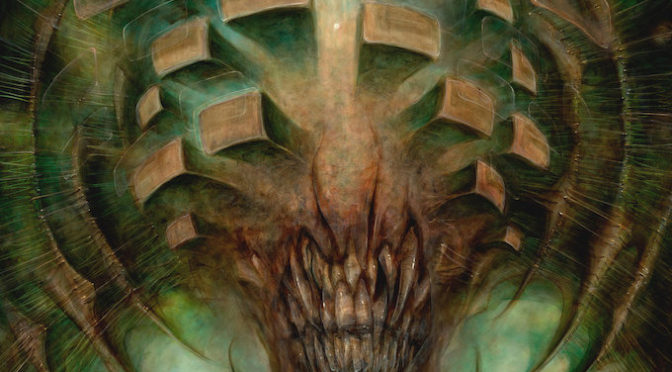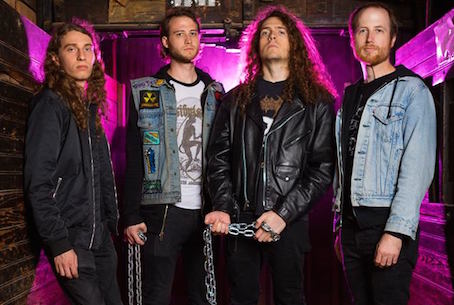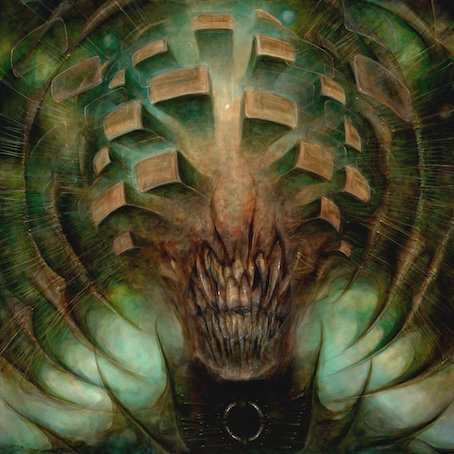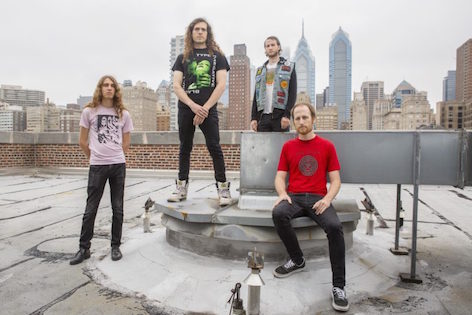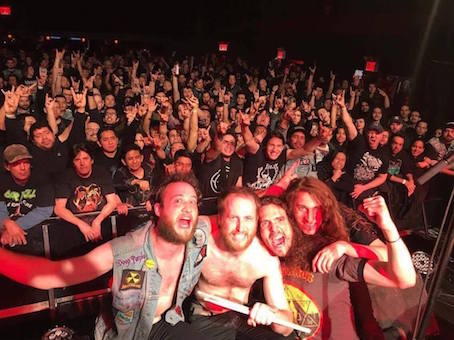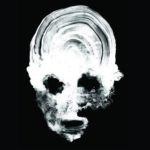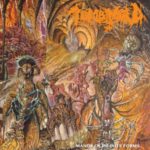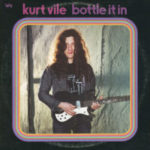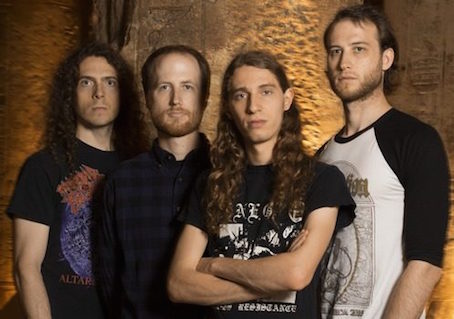EXCLUSIVE: INTERVIEW WITH HORRENDOUS !!
“We Definitely Did Not Have Any Intention Of Sounding Like The Bands Like Cynic, Death, Atheist, And In My Mind Any Similarities Between Us And Them Are Mostly Philosophical. “
DISC REVIEW “IDOL”
2009年に Matt と Jamie の Knox 兄弟、そして Damian Herring によって産声を上げたフィラデルフィアの “ポストデスメタル” アクト HORRENDOUS。デスメタルの過去と未来を繋ぐその進化の徒花は、アルバムを重ねるごとに狂気の色を濃くしています。
USデスメタルとヨーロピアンデスメタル、もしくは古の残虐と技術革新を結ぶ “恐怖の” 架け橋。オールドスクールへの憧憬を垣間見せつつ、CYNIC や DEATH を彷彿とさせる洗練されたコンポジションとテクニックに、EDGE OF SANITY や DARK TRANQUILLITY のロマンチシズムを封入。さらにはマスロックの難解、ポストロックのアトモスフィアさえ加味した前作 “Anareta” は、新旧メタルファンから絶賛を受けたマイルストーンとなりました。
しかし、「冒険的という意味では、どの作品でも僕たちはずっと “プログレッシブ” だったつもりなんだ。ただし、ほとんどのリスナーが最新作を最もプログレッシブなアルバムだと言うのは分かるんだけどね。」 と Jamie が語る通り、進化を止めないバンドの冒険は真の意味での “プログレッシブ” を一層探求した新作 “Idol” へと結実しています。
Jamie の「Alex がライティングプロセスへと加わることでこのアルバムに違いが生まれたのは確かだけどね。というのも、彼はフィラデルフィアのシーンの中でもエクスペリメンタルやフリージャズに精通しているからね。」 との言葉が裏付けるように、長年ベースレスのトリオとして積み重ねて来たバンドの実験的フィロソフィーは、卓越したベースマン Alex Kulick の加入でその深淵を一層増すこととなりました。
CYNIC を想起させるアトモスフェリックなイントロダクション “Prescience” は作品のムードを決定付ける重要なスターター。デスメタルシーンのトレンドがオールドスクールへと傾く中、HORRENDOUS の選択はあくまでも実験性とテクニックの追求でした。もちろん、ベースラインの蠢くようなジャズダンスも Alex の鮮烈な紹介状となっていますね。
邪悪な影が際立つ “Soothsayer” はフォーピースとなったバンドの能力を最大限に見せつけたアドレナリンラッシュ。DEATH よりも複雑に、CYNIC よりも哲学的に、AUTOPSY よりも陰重に。エゴにも似た各自の煌めく技巧は、いつしか一塊りとなりバンドの飽くなき欲望を代弁していきます。
Marty Friedman はもちろん、時に Chris Poland をもイメージさせるインテレクチュアルな Matt と Damian のツインギターアタックは、アルバムを通じて MEGADETH のスリルを再現していますね。
幽玄なアルペジオと Alex のジャズダンスに導かれる “The Idolater” は、バンドの重厚で繊細なレイヤードへの拘りが体現した楽曲。まるでワーグナーに魅入られたかのように威風堂々、高尚かつ壮大なデスメタル楽劇は、リスナーをリピートの無限地獄へと陥れる好奇心の泉なのかもしれません。その中毒性は、いつしか視聴毎に訪れる新たな発見の喜びへと変化していきます。
“Divine Anhedonia” は何よりバンドの実験精神が憑依した楽曲でしょう。メインリフで祝われる Miles Davis の “Bitches Brew” にも通じるロックとジャズの婚姻は、メタルのエナジー、そして千変万化な触手の如きタイムストラクチャーをも纏って “無快楽” を快楽へと転化するのです。確かに “リズムの可能性の探求は “Idol” の大きな部分を占めて” いるようですね。
“Devotion (Blood for Ink)” のクリーンボーカルとグロウルの対比に在りし日の OPETH へと想いを馳せるファンも多いでしょう。それにしても実に多様で創造性に満ちた作品です。「CYNIC, DEATH との相似点はむしろ哲学的なものなんだ。」その言葉こそが “Idol” “偶像” の本質を射抜いているのではないでしょうか。
今回弊誌では、HORRENDOUS のメンバー全員にインタビューを行うことが出来ました。「僕にとっては大前提として、ジャズとはジャンル分けの言葉というよりも政治的な言葉なんだ。」 本誌2度目の登場。どうぞ!!
HORRENDOUS “IDOL” : 9.9/10
INTERVIEW WITH HORRENDOUS
Q1: First of all, Horrendous has been three piece band from the beginning. But after “Anareta”, bass player Alex Kulick joined in the band. What made you become quartet?
【JAMIE】: A number of reasons, really. Before Anareta we played live very rarely, maybe 3 or 4 times per year, so it didn’t make sense to find a bass player, teach him or her all the songs, and keep them practiced and ready to go. We were also located in Columbia, SC at the time, which is a small college town with a very small metal scene. In other words, we didn’t have many reasonable candidates that could join the band. Additionally, the songs on our albums before Anareta were less complicated and could, in many cases, be performed well without live bass. Our music has gradually become more complex with each album, and it got to a point that we couldn’t afford to play live without bass anymore – we were missing a large chunk of our sound. So after we moved up North and began to play live more often and on bigger shows, we decided it was time to get a live bass player. Alex ended up filling the role – he has remained with the band ever since his first show with us in early 2016, and he contributed significantly to the writing for Idol.
Q1: 結成当初から3ピースを貫いて来た HORRENDOUS ですが、新たにベーシスト Alex Kulick が加入し4人体制となりましたね?
【JAMIE】: 彼の加入にはいくつか理由があるんだよ。”Anareta” 以前、僕たちはほとんどライブ活動を行っていなかったんだ。それこそ、年に3回か4回くらいしかね。だから当時は、新たにベースプレイヤーを見つけて1から全てを教える労力が馬鹿らしかったんだ。
それに、あの頃僕らはサウスカロライナ州のコロンビアに住んでいたんだけど、小さな学園都市でメタルシーンも小規模なものだったね。つまり、あの時はベーシストを加入させる合理的な理由がなかった訳さ。
加えて、”Anareta” 以前の楽曲はそこまで複雑ではなかったから、大抵はベース抜きでもライブで上手くプレイ出来たんだ。ただ、僕たちの音楽はアルバムを重ねる毎に徐々に複雑さを増し、遂にベース無しでライブを行うことが困難になってしまったんだ。サウンドの中でチャンクを見失ってしまうようになってね。
それでアメリカ北部へ引っ越して、より大きなショウを多く行い始めた僕たちは、そろそろベーシストを加入させることに決めたのさ。
Alex はすっかりその役割を果たしてくれたね。2016年初頭に行った彼との初めてのライブからずっとバンドに帯同しているし、”Idol” のライティングにも意義深い貢献を果たしてくれたよ。
Q2: Also, after the big success of “Anareta”, you transferred from Dark Descent Records to Season of Mist. It seems step up for the band. What’s your perspective about the label and the roosters like Cynic, Gorguts and Beyond Creation?
【JAMIE】: We wanted to try something new and to potentially expose different audiences to our music, and SoM ended up being the best fit. We liked that they have a varied roster in terms of music styles, and they also include bands further on the experimental/progressive side of the metal spectrum as you mentioned – we figured that fans listening to these bands might be interested in us as well. SoM also has a big reach in Europe and internationally, which is something we’ve never had before. Our experience with the label has been great thus far.
Q2: 同時に、前作からのインターバルで Dark Descent Records から Season of Mist へと移籍を果たしましたね?
CYNIC, GORGUTS, BEYOND CREATION といったビッグネームが所属するレーベルへの移籍は、バンドにとってステップアップに思えますが。
【JAMIE】: 何か新しいことに挑戦したかったのと、僕たちの音楽を異なるオーディエンスにも届けられる可能性を増やしたかったんだ。だからこそ、Season of Mist は最高にフィットしたね。
音楽的なスタイルという意味では、彼らのロースターは幅広くて気に入っているよ。それに君が挙げたようなエクスペリメンタル/プログレッシブサイドのメタルを探求するアーティストも揃っているしね。きっと彼らのファンのみんなも、僕たちに興味を持ってくれるはずだからね。
それに、Season of Mist はヨーロッパ、そして世界的にも大きな影響力をもっているからね。それはこれまでの僕たちにはなかったものだよ。彼らとの仕事は今のところとても順調なんだ。
Q3: So, let’s talk about your newest release “Idol”. Actually, the artwork by Brian Smith and this title are really impressive. What’s the lyrical theme of this incredible record?
【JAMIE】: The album’s lyrics tend to center around the various idols in our lives that exert a negative influence on us. These idols are individuals, institutions, gods, etc. in which we place our faith and to which we relinquish our autonomy and individuality, and the album is about the harm of falling under their spell. We were influenced by a number of negative forces while creating the album, including the current geopolitical situation of the Western world, self-doubt stemming from our occupations, and even the painful creation process of our new album. We were all under significant stress while making Idol, and this feeling found its way into the album’s lyrics very directly. We feel that the music is also more paranoid and manic than on our previous albums, and this seems to complement the lyrics well.
Q3: では最新作 “Idol” について話しましょう。Brian Smith の手によるアートワーク、そしてこのタイトルには実に好奇心をそそられました。
【JAMIE】: このアルバムの歌詞は、僕たちの人生にネガティブな影響を及ぼす様々な “偶像” についてフォーカスしているんだ。その偶像は、個人であったり、団体、神など様々だよ。そこに自らの信仰を置き、自律性と個性を放棄するようなね。そしてアルバムは、彼らの術中に落ちることの害について訴えているのさ。
僕たちは、アルバムを制作する際に多くのネガティブな力に影響されたんだ。現在の西欧世界の地政学的状況、僕たちの仕事に起因する疑念、そして新作の産みの苦しみさえも含めて、”Idol” を作っている間、全員がかなりのストレスにさらされていたんだ。そしてその感覚はアルバムの歌詞へと実に直接的に封じられているのさ。
同時に、音楽的に以前の作品より偏執的で躁の状態にあると感じているから、それもこの歌詞にピッタリだと思うな。
Q4: With joining of Alex, Horrendous’s overall sound becomes more progressive. I mean, “Prescience” is nice introduction, I think he uses fretless bass, and that reminds me Prog-death giants like Cynic, Death, and Atheist. In the writing process, did you intend to explore their influences more than before?
【JAMIE】: Alex actually does not use a fretless bass – he just plays in a manner that evokes the fretless sound. I would say that we’ve become more “progressive,” in the sense that it means adventurous, consistently with each release, and I think most people would consider our newest album to be our most progressive. This progression stems from our desire to continually challenge ourselves and to try new things as we improve our technical and songwriting abilities – we don’t want to release the same album twice, and we are constantly expanding our musical interests with time as we explore new genres as listeners. From these new places, we learn how other musicians think about creating music and apply parts of these philosophies to our own. We definitely did not have any intention of sounding like the bands you mention here, and in my mind any similarities between us and them are mostly philosophical. The inclusion of Alex during the writing process did make a difference for this album since he matured in the experimental and free jazz music scene in Philadelphia – his experience brought a new perspective to our songwriting.
Q4: Alex のフレットレスベースが加わったことで、方向性的としては CYNIC, DEATH, ATHEIST といったプログデスの巨人へと近づいた印象です。
【JAMIE】: 実は Alex はフレットレスベースは使用していないんだ。ただフレットレスのサウンドを喚起させる方法でプレイしているだけなんだよ。
冒険的という意味では、どの作品でも僕たちはずっと “プログレッシブ” だったつもりなんだ。ただし、ほとんどのリスナーが最新作を最もプログレッシブなアルバムだと言うのは分かるんだけどね。
この進化は、僕たちの常に新たなものへチャレンジし続けたいという欲求から来ているんだ。テクニックやソングライティングの能力を向上させたいというね。同じようなアルバムは2枚と作りたくないし、リスナーとしても音楽的な好奇心を常に拡大したいと思っているんだ。そうやって新たな領域を拡大すれば、他のミュージシャンのクリエイティブな考え方も学べるし、その哲学を僕たちの音楽へと還元することも可能だからね。
ただ、君が挙げたようなバンドのサウンドを狙った訳では決してないよ。僕の中で、僕たちと彼らの相似点はむしろ哲学的なものなんだ。
まあ確かに、Alex がライティングプロセスへと加わることでこのアルバムに違いが生まれたのは確かだけどね。というのも、彼はフィラデルフィアのシーンの中でもエクスペリメンタルやフリージャズに精通しているからね。だから、彼の経験が僕たちのソングライティングに新たな視点をもたらしたのは確かだよ。
Q5: Compared with “Anareta”, I think there are definitely much more layered sounds and diversity about harmony, melody line and atmosphere in “Idol”. Do you agree that?
【DAMIAN】: Yes, I’d agree that Idol is probably our most layered album. With every album, we spend time during the recording process writing additional leads to lay over top the main songs, and on Idol, we took this even further. We take great pleasure when people tell us that they discover something new with every listen, and even when we ourselves are listening back to the album, we end up hearing things that we forgot we added in, haha. I think that, combined with some of the the more adventurous and experimental parts on the album, these details really add to the atmosphere.
Q5: “Anareta” と比較して、”Idol” はハーモニーやメロディーライン、アトモスフィアが細部までより多重にレイヤーされているようにも感じました。
【DAMIAN】: うん、同意するよ。おそらく “Idol” は僕らの作品で最も多重にレイヤーされたアルバムだと思う。どのアルバムでも、僕たちはレコーディングの最中に、楽曲へと重なり合うリードパートを書いて加えていくんだけど、”Idol” ではその作業をさらに突き詰めたのさ。
僕たちは、リスナーが楽曲を聴くたび新たな発見を伝えてくれるのがとても嬉しいし、僕たちでさえ聴き返した時に加えていた要素を忘れているくらいだからね。(笑)
そうやって実験的で冒険的な要素がアルバムにより加味されたことで、様々なアトモスフィアが生まれたんだと思うな。
Q6: Regarding Progressive, lot’s of Jazz inspired sounds like phrase, rhythm approach and code progression in this record. What’s Jazz to you?
【ALEX】: Aha! The big question. I’m really happy to be able to try and answer this in a discussion about metal. First and foremost, jazz is a political word rather than a descriptive term, so it means something pretty different to everyone (I’m sure we could talk about this in terms of “metal” as well!). For me, when I’m talking about “jazz,” I’m talking about the world of sounds, ideas, and approaches that come from the Black Music tradition. We’ve spent a lot of time listening to records that come out of that and talking about what’s going on in the music there. That said, I actually don’t think there’s anything on the surface of the music on Idol that’s trying super hard to be “jazzy,” but I can think of a few aspects of it that point in the direction of that influence on us all. For instance, the exploration of rhythmic possibilities is a big part of the music on Idol which, for me, comes from the tradition we’re talking about. Rhythm and Time are such central considerations in “jazz” musics, and I think our listening has opened us up to new ways of phrasing, syncopating, constructing, and feeling pulses. Another thing is the style of bass playing all over the album, where instead of just playing the foundational riffs I’m often dancing around with my own melodic lines. A lot of those were improvised in the studio, and they definitely have a character that recalls some “jazz” playing (the Jaco Pastorius influence is probably pretty obvious!). Bass as a lead instrument that can explore in addition to holding things down definitely comes in part from that stuff. Also, the way the bass and drums converse with each other―sometimes in unison and others in counterpoint and often away from what the guitars are doing―is something that I think also pulls from this. In terms of harmony, you hear a really wide range of note/chord choices in “jazz” stuff that opens us up to new considerations, but I don’t think we go terribly far outside of metal’s bounds on that front. We’re all super willing to experiment though, and we always do. For me, at the root of all these ideas, there’s a freedom in terms of what an instrument can do in an ensemble context. Of course implied then is also a freedom in terms of what people can do. That comes from “jazz,” Black Music, that’s part of what I think it’s all about. It’s a vision of what’s possible. Matt once said to me that metal was about being “larger than life, if only for a moment,” and I see a connection there between “jazz” and the best things metal has to offer.
Q6: プログレッシブと言えば、”Idol” ではフレーズ、リズムアプローチ、コードプログレッションなど、ジャズからの影響が色濃く感じられましたが、バンドにとってジャズとはどういった存在ですか?
【ALEX】: これは凄い質問だね!(笑) いや、メタルに関するディスカッションの中でジャズについて話せるのはとても嬉しいね。
まず僕にとっては大前提として、ジャズとはジャンル分けの言葉というよりも政治的な言葉なんだ。だからみんなの考え方とは全然違うと思うんだ。まあメタルに関しても同様なんだけどね!
僕がジャズについて話すときは、ブラックミュージックの伝統を由来とするサウンド、アイデア、アプローチの世界なんだ。僕たちは多くの時間共にそういったレコードを鑑賞し、その音楽の中で何が起きているのか話し合って来たんだ。だからね、”Idol” の表面全体を “ジャジー” にすることはとても困難だと思ったんだけど、僕たち全員ジャズからの影響があるんだからいくつかの側面でジャズを取り入れることは可能だと思ったんだ。
例えば、リズムの可能性の探求は “Idol” の大きな部分を占めているんだけど、僕にとってそれはさっき話したようなブラックミュージック由来のものなんだ。リズムとタイムストラクチャーはジャズの音楽で柱となる考え方だよ。そして僕たちはジャズを聴き込むことで、フレージング、シンコペーション、構成力、それにフィーリングの面で新たな道を切り開いたんだ。
アルバムを通してベースプレイのスタイルにも変化が起こったね。基本となるリフをただ反芻する代わりに、僕はしばしば自身のメロディーラインを踊るんだ。それらの大半はスタジオでインプロヴァイズされたもので、確かにジャズを想起させる性質をもったものなんだ。特に Jaco Pastorious からの影響はおそらくとても顕著だね!
そしてリード楽器としてのベースもその延長上で探求出来るはずなんだ。それにユニゾン、カウンターポイント、ギターから離れたフレージングといったベースとドラムスの会話的な演奏も、そういったジャズの哲学から引き出すことが可能だと思うな。
さらに、ハーモニーという視点で見れば、ジャズにおいて音やコードの選択は実に幅広いことが分かると思う。その選択の幅が新たな思考を生み出すんだ。ただし、僕たちはそんなに大袈裟にメタルの領域から離れたつもりはないよ。ただ心底実験的なことがしたいし、いつもそうやって来ただけなんだ。
僕にとって、これらすべてのアイデアの根底には、楽器がアンサンブルの状況でも自由が保障されているという考えがあるんだ。もちろん、人々が行うことに関してもまた自由があるよ。そしてその考え方は “ジャズ”、ブラックミュージックから来ているんだ。何が可能かについてのビジョンとも言えるね。
Matt はかつて僕に、「メタルは一瞬かもしれないけど、間違いなく伝説となった。」と言ったんだ。僕はそのメタルの中にある最良のものをジャズと繋げようとしているのさ。
Q7: “Devotion (Blood for Ink)” has incredible contrast. And ethereal clean vocal becomes key of this song. Do you think such a clean part will increase next records?
【JAMIE】: That is hard to say for sure, but we always love experimenting with cleaner vocals and we certainly did so a bit more on Idol than previous albums. I suspect we’ll consider experimenting with them more as time goes on. There is a large group of extreme metal traditionalists that does not appreciate clean vocals, and we’ve definitely heard from some of these people regarding Idol. But there are certainly others who said they want us to incorporate even more clean singing in the future. We’ll end up doing it to the degree that it feels natural.
Q7: “Devotion (Blood for Ink)” で見せるコントラストは驚異的です。エセリアルなクリーンボーカルは間違いなく楽曲の鍵となっていますね?こういったクリーンボイスは今後増えて行くのでしょうか?
【JAMIE】: どうだろう、確かなことは言えないなあ。ただ僕たちは、いつもこういったクリーンボイスで実験するのが気に入っているし、”Idol” では以前よりも確かに少し増えているよね。きっと時が経つにつれて、その実験は増えていくんだろうと考えているよ。
クリーンボーカルを認めないエクストリームメタル保守派の大きな勢力が存在するのは知っているよ。そしてそういった人たちが “Idol” をどう見ているかもね。だけど、将来的にクリーンボーカルをもっと聴きたいと言っているファンも確かにいるんだよ。まあだから、自然だと思える程度に入れていくよ。
Q8: There are so many guitar solos in this album. Regarding lead guitar, who are your heroes?
【MATT】: My all time favorite guitar hero is definitely Marty Friedman. His playing is so distinct, and he is always focused more on melody and building a drama with his soloing rather than playing a million notes at light speed. He also tends to avoid typical patterns that you hear most metal guitarists playing–the tried and true patterns we learn on guitar and play mechanically for hours with a metronome–instead opting for unique phrasing and interesting rhythmic choices to create something memorable. His playing influenced me so much growing up because he embodied the soul of the greats before him who focused on crafting these huge, larger than life solo sections while also having a foot firmly planted in the heyday of shred guitar from his contemporaries in the late 80s. I think he has the perfect balance of the two, and I’ve always admired that.
In addition to him, I can’t help but be influenced by the usual suspects-Tipton/Downing, Murray/Smith, Dimebag, Randy Rhodes, etc. Some less obvious influences include the Amott brothers (I still adore the solos on Burning Bridges!) and Bill Steer.
Lately, I’ve also been gathering influence from jazz players (many of them not guitarists!), though I’m still pretty new to really digging into what these players are accomplishing with their solos.
Q8: アルバムには多くのスリリングなリードギターが収録されています。あなたのギターヒーローについて語っていただけますか?
【MATT】: 僕のオールタイムフェイバリットのギターヒーローは、Marty Friedman だよ。彼のプレイはとても個性的で、ギターソロはいつもメロディーとドラマを構築することにフォーカスしているんだ。100万の音を光の速さでプレイする代わりにね。
それに、彼は大半のメタルギターで耳にする典型的なパターンを避けようとしているよね。メトロノームに合わせて何時間も練習して学んだ絶対安全のパターンをね。その代わりに、ユニークなフレーズ、リズムのチョイスを配置して印象深い何かを創造しているんだ。
彼のプレイは僕の成長期に大きな影響を与えたよ。それは、彼が80年代後半のシュレッドギター全盛期にしっかりとそのルーツを置きながらも、彼以前に存在した巨大で伝説的なソロイストの魂を体現しているからなんだ。両者の完璧なバランスを保っていると思うな。そして僕はその点をとても崇拝して来たんだよ。
彼以外にも、Tipton / Downing, Murray / Smith, Dimebag Darrell, Randy Rhodes からの影響を挙げない訳にはいかないだろうね。彼らよりは影響が少ないけど、Amott 兄弟 (“Burning Bridges” のソロには今でも心酔しているよ) や Bill Steer もね。
最近はジャズプレイヤーからの影響も増えているんだ。彼らの多くはギタリストじゃないんだけどね!だけどそういったプレイヤーが成し遂げたソロワークは、今でも実に新鮮で惹き込まれるよ。

